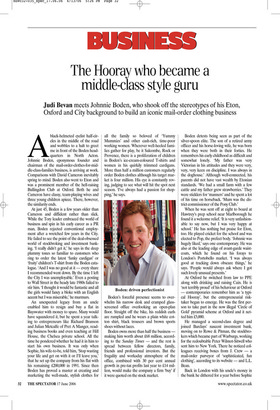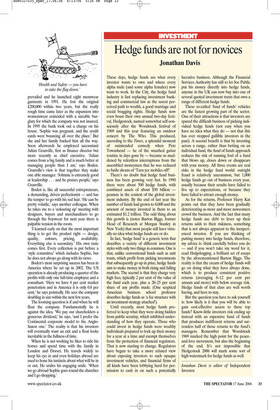BUSINESS
The Hooray who became a middle-class style guru
Judi Bevan meets Johnnie Boden, who shook off the stereotypes of his Eton, Oxford and City background to build an iconic mail-order clothing business Ablack-helmeted cyclist half-circles in the middle of the road and wobbles to a halt to greet me in front of the Boden headquarters in North Acton. Johnnie Boden, eponymous founder and chairman of the mail-order-clothes-for-middle-class-families business, is arriving at work. Comparisons with David Cameron inevitably spring to mind. Boden also went to Eton and was a prominent member of the hell-raising Bullingdon Club at Oxford. Both he and Cameron have classy, team-playing wives and three young children apiece. There, however, the similarity ends.
At just 45, Boden is a few years older than Cameron and diffident rather than slick. While the Tory leader embraced the world of business and spin in his early career as a PR man, Boden rejected conventional employment after a wretched few years in the City. He failed to see the point of the deal-obsessed world of stockbroking and investment banking. ‘I really didn’t get it,’ he says in the deep plummy tones so familiar to customers who ring to order the latest ‘funky cardigan’ or ‘fruity’ children’s T-shirt from the Boden catalogue. ‘And I was no good at it — every share I recommended went down. By the time I left the City I was unemployable.’ Even a posting to Wall Street in the heady late 1980s failed to stir him. ‘I thought it would be fantastic and all the girls would fancy a bloke with an English accent but I was miserable,’ he murmurs.
An unexpected legacy from an uncle enabled him to resign and buy a flat in Bayswater with money to spare. Many would have squandered it, but he spent a year talking to entrepreneurs like Richard Branson and Julian Metcalfe of Pret A Manger, reading business books and even teaching at Hill House, the Chelsea private school. All the time he pondered whether he had it in him to start his own business. It was only when Sophie, his wife-to-be, told him, ‘Stop wasting your life and get on with it or I’ll leave you,’ that he set up the company from his flat with his remaining £200,000 in 1991. Since then Boden has proved a master at creating and marketing the well-made, stylish clothes for all the family so beloved of ‘Yummy Mummies’ and other cash-rich, time-poor working women. Wherever well-heeled families gather for play, be it Salcombe, Rock or Provence, there is a proliferation of children in Boden’s ice-cream-coloured T-shirts and women in his quirkily trimmed cardigans. More than half a million customers regularly order Boden clothes although his target market is four million. His eye is constantly roving, judging to see what will hit the spot next season. ‘I’ve always had a passion for shopping,’ he says.
Boden’s forceful presence seems to overwhelm his narrow desk and cramped glassscreened office overlooking an open-plan floor. Straight off the bike, his reddish curls are rumpled and he wears a plain white cotton shirt, black trousers and brown sports shoes without laces.
Boden owns more than half the business making him worth about £68 million, according to the Sunday Times — and the rest is spread between fellow directors, family, friends and professional investors. But the frugality and workaday atmosphere of the office, combined with 30 per cent annual growth in pre-tax profits last year to £14 million, would make the company a firm ‘buy’ if it were quoted on the stock market. Boden detests being seen as part of the silver-spoon elite. The son of a retired army officer and his horse-loving wife, he was born when they were both in their forties. He remembers his early childhood as difficult and somewhat lonely. ‘My father was very Victorian in his attitudes and they were very, very, very keen on discipline. I was always in the doghouse.’ Although well-connected, his parents did not have vast wealth by Etonian standards. ‘We had a small farm with a few cattle and my father grew strawberries.’ They were sticklers for ‘manners’ and he spent a lot of his time on horseback. ‘Mum was the district commissioner of the Pony Club.’ When he was sent off at eight to board at Hawtrey’s prep school near Marlborough he found it a welcome relief. ‘It is very unfashionable to say now, but I was very happy at school.’ He has nothing but praise for Eton, too. He played cricket for the school and was elected to Pop, the prefect body. ‘Johnnie was hugely liked,’ says one contemporary. He was also at the leading edge of avant-garde waistcoats, which he found on his forays to London’s Portobello market. ‘I was always good at tracking down obscure things,’ he says. ‘People would always ask where I got such lovely unusual presents.’ At Oxford he switched from law to PPE along with drinking and raising Cain. He is ‘not terribly proud’ of his behaviour at Oxford — contemporaries remember him as ‘a typical Hooray’, but the entrepreneurial risktaker began to emerge. He was the first person to take part in the now illegal ‘Circle of Gold’ pyramid scheme at Oxford and it netted him £5,000.
He managed a second-class degree and joined Barclays’ nascent investment bank, moving on to Rowe & Pitman, the stockbrokers which became part of Warburgs, working for the redoubtable Peter Wilmot-Sitwell who sent him to New York. There he noticed colleagues receiving boxes from J. Crew — a mail-order purveyor of ‘sophisticated, fun clothing’, according to its website — and L.L. Bean.
Back in London with his uncle’s money in the bank he dithered for a year before Sophie prevailed and he launched eight menswear garments in 1991. He lost the original £200,000 within two years, but the really rough time came later as the expansion into womenswear coincided with a sizeable burglary for which the company was not insured. In 1995 the bank took out a charge on his house. ‘Sophie was pregnant, and the credit cards were bouncing all over the place.’ But she and her family backed him all the way. Soon afterwards he employed accountant Julian Granville, first as finance director but more recently as chief executive. ‘Julian comes from a big family and is much better at managing people than I am,’ says Boden. Granville’s view is that together they make one able manager. ‘Johnnie is extremely good at leadership ... and he praises people,’ says Granville.
Boden is, like all successful entrepreneurs, a demanding, driven perfectionist — and has the temper to go with his red hair. ‘He can be pretty volatile,’ says another colleague. When he takes me to a ‘colouring up’ meeting with designers, buyers and merchandisers to go through the boyswear for next year there is palpable tension in the room.
‘I learned early on that the most important thing is to get the product right — design, quality, colours, pricing, availability. Everything else is secondary.’ His own taste comes first. Every collection is put before a ‘style committee’ which includes Sophie, but he does not always go along with its views.
Boden’s most surprising success has been in America where he set up in 2002. The US operation is already producing a quarter of the profits with only one full-time employee and a consultant. ‘Here we have 8 per cent market penetration and in America it is only 0.8 per cent,’ he says pointedly. He sees the company doubling in size within the next few years.
The looming question is if and when he will float the company. Fundamentally he is against the idea. ‘We pay our shareholders a generous dividend,’ he says, ‘and I prefer the Continental corporate model to the AngloSaxon one.’ The reality is that his investors will eventually want an exit and a float looks inevitable in the fullness of time.
When he is not working he likes to ride his horses and spend time with the family in London and Dorset. He travels widely to keep his eye in and even holidays abroad are used to hone his instincts about what will be in or out. He smiles his engaging smile. ‘When we go abroad Sophie goes round the churches and I go shopping.’



















































































 Previous page
Previous page